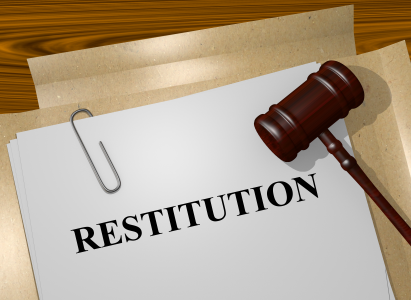YOU’RE REAR ENDED BY A DRUNK DRIVER ON THE FREEWAY. The at-fault driver is arrested, but you’re whisked away to the hospital to check for serious injuries. Months later you get a call from the local district attorney’s office asking if you would like to appear at a criminal restitution hearing regarding the accident. Should you appear? Does this bar you from further recovery in civil court?
If the civil defendant (at-fault driver, in our example) is convicted of a crime – be it an infraction, misdemeanor or felony – and that crime caused the injuries that were a subject of the civil suit, victim restitution comes into play. As a victim, the plaintiff is entitled to restitution. While it is true the victim/plaintiff cannot recover twice for the same injury, restitution can still make a huge difference in the take home for the plaintiff. The reason: a victim may recover restitution for the attorneys’ fees incurred in his or her civil case against the defendant. People v. Pinedo (1998) 60 Cal. App. 4th 1403, 1406, 71 Cal. Rptr. 2d 151. An example will make the financial impact of this right clear.
Let’s continue with the example above: after your accident, you hire a local personal injury attorney on a 40% contingency fee. The defendant pleads guilty to driving under the influence. There is a $100,000 civil settlement, comprised half of economic (medical bills, therapy, lost wages) and non-economic (emotional distress) damages. The attorney will receive about $40,000 as their fee. After you receive the civil settlement, you can later go to criminal court and seek a restitution order for one-half of the contingent fee, $20,000. This amount is sought because one-half of the civil settlement was for economic losses. The victim had to pay attorney fees to get that part of the civil settlement, and you are therefore entitled to recoup the same from the defendant as restitution. The criminal court can order $20,000 in restitution. That means your net civil recovery of $60,000 ($100,000 less the $40,000 contingency fee) will increase by 33% to $80,000. That is a huge increase which may be left on the table.
Realistically, to get a $20,000 restitution order will certainly take an independently wealthy defendant as well as multiple appearances in criminal court, but is available to the victim of a crime. Representation in criminal court, however, usually requires an hourly charge. The defendant is entitled to, and will, oppose the restitution. There will be briefing in addition to hearings on the subject in order for a judge to be able to award any restitution.
A natural question is who pays for this excursion into criminal court. The answer is in a statute: Penal Code § 1202.4(f)(3)(H) allows recovery by victims (as part of restitution) of their “actual and reasonable” attorneys’ fees. So the victim may recover, from the defendant, any fees expended in criminal court to get fees in the civil case.
Although it may take several appearances to get to the restitution hearing, that hearing stands in stark contrast to a civil trial and its antecedents: no discovery, no depositions, proof may be made by declaration and live witnesses are not required. A restitution hearing can be put on calendar within weeks in most criminal courts. Most hearings take less than an hour, if appropriate preparation and briefing has been done.
But you, the savvy client, ask about the release you signed as part of your civil case. “[T]he settlement of a civil action and release of the defendant by the crime victim does not discharge the defendant’s responsibility to satisfy the restitution order.” People v. Vasquez (2010), 190 Cal. App. 4th 1126, 1133. There are several reasons for this. First, one of the oldest laws on the books instructs: “When the violation of a right admits of both a civil and criminal remedy the right to prosecute the one is not merged in the other.” Code of Civil Procedure §32 (1872), entitled “Civil and Criminal Remedies not Merged.”
Another reason is that the parties are not the same in a civil case and a criminal case. A victim is not a party to a criminal prosecution. The only parties are the People and the defendant. A third reason the civil settlement release cannot spill over into a criminal case is because restitution has a unique criminal law purpose: rehabilitation. Making criminals pay restitution to the victim is part of the learning experience for a defendant; a learning experience intended to direct the defendant away from illegal activity. Hopefully.
Once restitution has been ordered, additional tools are available to enforce payment. The criminal system has its own garnishment procedures. If the trial court determines that the defendant has the ability to pay restitution, it must enter a separate order for income deduction once restitution has been determined. Penal Code §1202.42. Also, when the court grants probation and orders the defendant to make restitution, timely payment is a condition of probation. Willful failure to pay restitution can result in revocation of probation and imprisonment. People v Lawson (1999) 69 Cal. App. 4th 29, 39, 81 Cal. Rptr. 2d 283. Thus, creating the urgency to pay the restitution order.
While this restitution tool may not apply to every case, it is a powerful tool to utilize when restoring an injured Plaintiff. Make sure to consult with an experienced and knowledgeable injury attorney before getting intimidated by a request to testify in criminal court.
—
The author, Joshua Bonnici, is the managing attorney at BONNICI LAW GROUP, APC, who represents injured and disabled individuals fight for fair and just outcomes. Feel free to learn more and reach out, at: help@bonnicilawgroup.com, or at: 858-261-5454.

Personal Injury in West Hollywood, CA
West Hollywood, California, is a vibrant and dynamic city in the heart of Los Angeles, renowned for its artistic flair, trendy boutiques, and world-class entertainment scene.
Long-Term Disability Insurance Support in Venice, CA
Venice, CA, is a dynamic and eclectic neighborhood in Los Angeles, known for its bohemian vibe, historic canals, and artistic community.



